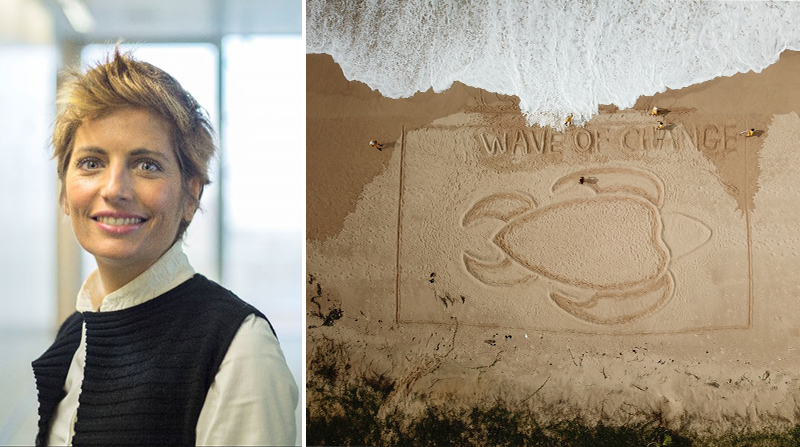

Gloria Fluxa Leads Iberostar’s Wave Of Change. Credit: Gloria Fluxà
When you walk around Barcelona’s beautiful Iberostar Paseo de Gracia, you won’t necessarily see Gloria Fluxà strolling the halls, but you’ll notice her presence at nearly every corner. The lotion and body wash dispensers in your room? That’s because of Fluxà. The responsibly caught salmon on Ca’s Menestral’s menu is her idea, too. And the fact that you won’t find a single plastic straw in your drinks at the stunning Sky Bar? Yes, you guessed it.
But it’s not just in downtown Barcelona where Fluxà, the daughter of Iberostar Hotels & Resorts’ visionary billionaire owner, Miguel Fluxà Rosselló, has made her impression; as the Spanish hotel brand’s vice chairman and chief sustainability officer, she ensures that all of the company’s 120 global properties (80 percent of which are beachfront) do their part to keep Planet Earth looking perky.
Iberostar’s grand conservation efforts are better known as Wave of Change. The initiatives that started in Spain (but will soon spread to all 18 countries with the brand’s hotels) focus on three vital areas: the elimination of single-use plastics, sustainable fishing and overall ocean protection.
In her first interview with a U.S.-based publication, Fluxà talked to Forbes Travel Guide about saving the seas, making ripples in a stagnant hotel industry and Iberostar’s overall place in the often-treacherous waters of high-end hospitality.
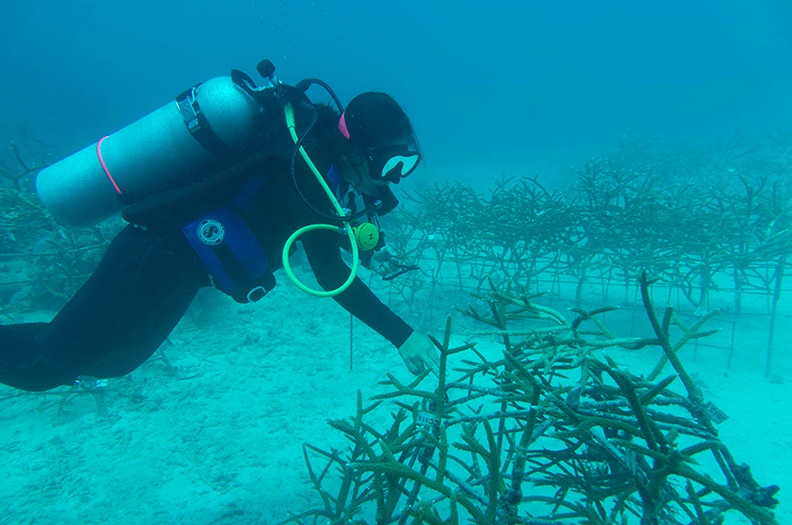
Underwater Studying. Credit: Gloria Fluxà
With climate change being a global topic right now, did that spark this initiative or have you always had your heart on conservation?
I believe it’s a question of always having a heart on conservation. I’m the fourth generation of a family business, Iberostar. It’s always been part of our philosophy and it’s not something that just started this past year. It’s always been within us. That’s from the Iberostar side.
Also, on more of a personal touch, my father has always been a hospitality entrepreneur; he’s the third generation. But my mother, she was born in a zoo, actually. My grandfather was a zoologist. So, on my maternal side, I have this scientific instinct. I am the granddaughter of an ecologist, biologist and zoologist.
There was a question of how we could combine the best of those worlds, and also apply it even further within the family business.
Of course, having the idea is one thing but taking the steps to make it a reality is something else. How were you able to apply such a bold initiative to such a big company?
First, the [research] findings were vital. Due to the high level of awareness that there is right now, we actually started conceptualizing the Wave of Change by the beginning of 2017. We were one of the first hotel chains to totally eradicate plastic straws in the summer of 2017. That was the first campaign.
But the real challenge, once we knew wanted to approach this, came from the sheer volume. We realized we are a company now that has 8.5 million clients passing through the properties each year. We’re a family of over 30,000 employees, a portfolio of 120 hotels, and we operate in 18 countries. So, the high level of complexity when it came to the different cultures and legislation was something that we had to tackle and accomplish at the beginning.
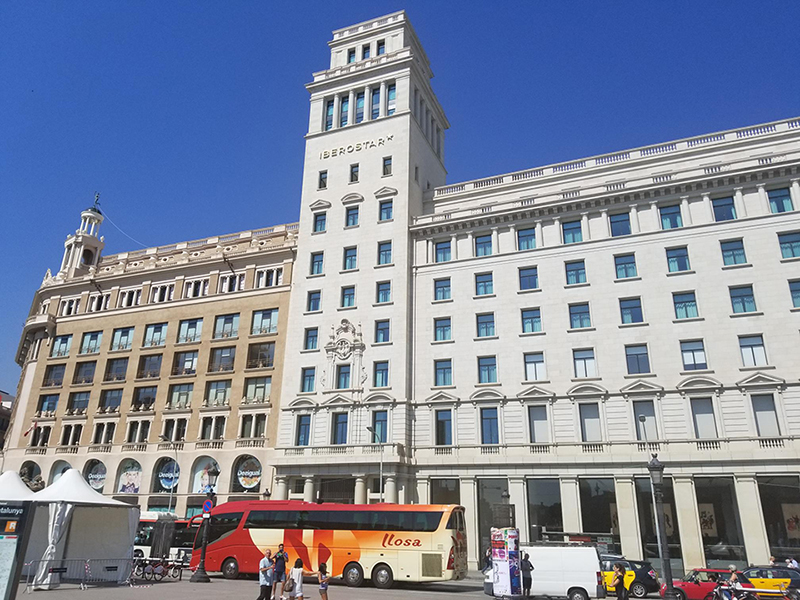
Iberostar Paseo de Gracia. Credit: DeMarco Williams
On the opposite side, what has made it easy is [everyone from] the members of our board of directors to entry-level managers at our hotels. That human talent that was so passionate about it because we realized the power of having a purpose and joining the movement. Wave of Change has been the easy part. And the part that was a pleasant surprise.
To start conceptualizing, you realize how many stakeholders were on the table — from an employee to a client to a supplier of a product. We really had to start with our employees because they are vital for the movement to move forward.
Yes, you can have these high-level ideas, but if housekeeping and the valet aren’t behind it, it’s not going to work.
Exactly. And coming back to the concept of giving and purpose, I’m approached by people, like a waiter at one of our hotels in the Canary Islands, telling me, “Oh, phenomenal. This Wave of Change [is good] because I am the son of a fisherman from the island. I know what it is and I feel really linked to it, so come to me for any type of support that you need.”
And those kinds of ideas are the ones that you realize, “Okay, the stakeholders are important to promoting a movement like this.” You really have to start with your employees because, otherwise, the movement wouldn’t generate anything dynamic.
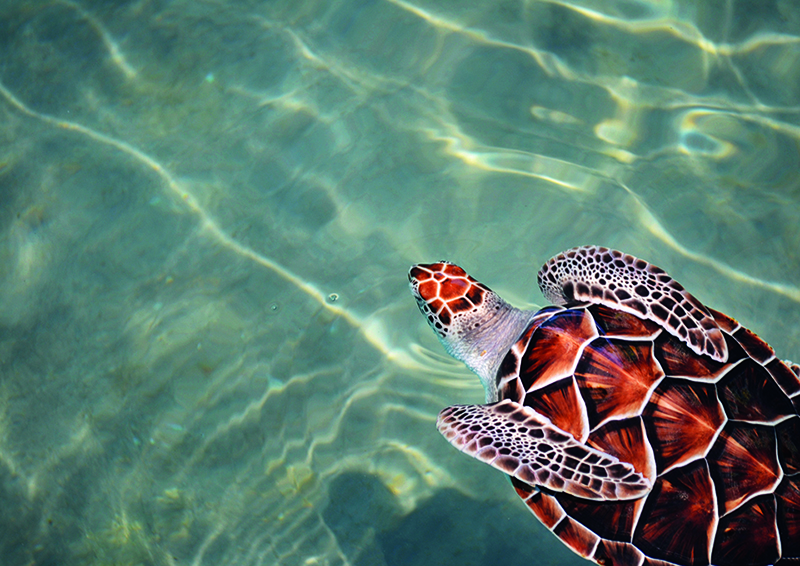
Keeping the Sea Clean for the Locals. Credit: Gloria Fluxà
What about the traveler? How have your guests responded to the changes so far?
The responses have been so far more positive than we expected. It has a bit to do with what we mentioned — the timing was right and the level of awareness is there. So, the customer really realized that it was something that, for them, had no implication and they feel happy to participate.
We did realize right away with regard to the travelers that we needed to communicate things right. Once the customers and the travelers understood that, they are more willing to participate.
How are you communicating Wave of Change’s message to each of your hotels?
When we realized that the employees were key for the execution and to really generate the movement, we knew that the training was vital.
We have a great team of people that is helping get that training with the different properties. We do [training] by department. We might have a meeting of chefs, then they would tackle the sustainable fishing. You would have a meeting of all the housemaids, and we would tackle all the elimination of the plastic in the rooms.
And then, personally, as being part of a family business, we are very hands-on. We like being on the property, we like observing and we like supporting as much as you can the movement on a personal basis.
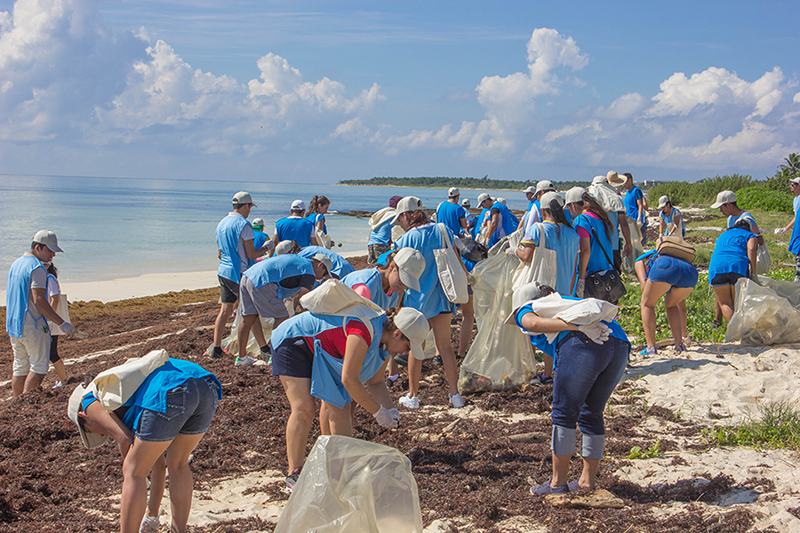
Shore Cleanup. Credit: Gloria Fluxà
What other changes do you perceive for Iberostar over the next four or five years?
We feel that we, in all humbleness, want to be the best international chain in sustainable tourism, but we want to remain a business that is 100 percent family owned. We want to lead in quality and satisfaction of our guests. And since we are a service company, we feel the relevance of also having a culture that is open and promotes innovation.
Our business philosophy will be very anchored within sustainability and the responsible management of the impact that our activity will generate, but will remain with a focus on people and the environment.
With the environment, since 80 percent of our activities or our hotels are front line on top of the beach and the ocean, we support and care for the ocean.
Is sustainability the characteristic that you want Iberostar to be best known for?
Because our focus is on our people and our environment, I think we would like to be known for having a differential service that is only achieved with our people and our staff. And when it comes to a focus on the environment, we want to be known for that sustainability aspect of our company, of course.
